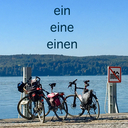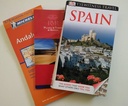
Spanish Language Game: Opposite Words
Quick Spanish Language Game: Opposite Words
Look at the list below, then play this quick online game to test yourself.
With this game, you learn 12 common Spanish words and identify their opposites.
Words in Spanish Language Game
primera - última [first - last (f)]
largo - corto [long - short (m)]
joven - viejo [young - old (m)]
fácil - difícil [easy - hard]
barato - caro [cheap - expensive (m)]
bueno - malo [good - bad (m)]
abrir - cerrar [to open - to close]
buscar - encontrar [to look for - to find]
continuar - terminar [to continue - to end]
llegar - depart [to arrive - to depart]
preguntar - contestar [to ask - to answer]
comprar - vender [to buy - to sell]
More than a Spanish Language Game
If you like our Spanish games, you can practice Spanish - online and completely for Free - with our 36-Scene story "David en España" by just logging in, or registering HERE.
You can find more resources for learning and practicing Spanish on FREELANGUAGE.ORG.
Our FREE Spanish 1 course will let you learn and practice Spanish playfully - with a travel-story of a young man in Spain and easy games.

French Language Game: aller-retour
Quick French language Game: "aller-retour" - return ticket
Level: Elementary (A2)
Playing Time: 3 1/2 minutes
Play a quick mini-story. Learn and practice buying a train ticket in French.
If you travel around France with friends or on your own, it'll come in very useful.
And, go practice some French numbers when you have the time.
Starting with 70, it gets a little complicated.Say the French OUT LOUD, always! Doing so is great for your pronunciation and memory.
Our games work especially well for mid to high Beginners who want to learn and review conversational French.
Words and phrases in French Language Game
- elle accompagne - she accompanies [accompagner]
- à la gare - to the station
- au guichet - at the ticket window
- il dit - he says [dire]
- un billet - one ticket
- seconde classe - second class
- pour Aix-en-Provence - to Aix-en-Provence
- aller simple - one-way [ticket]
- aller-retour - return [ticket]
- ça fait - that's [faire]
- soixante-quinze - seventy-five / 75
- en TGV - by TGV [high speed train]
- voilà - here's/here are
- quatre-vingts - eighty / 80
If you like our games, please SHARE us with your friends.
More Than a French Language Game
And don't forget: You can practice French online for FREE with our 36-Scene French 1 Travel-Story: "Daniel en France".
In it you learn and practice all the words, phrases and sentences you also hear in the podcasts.
Just login HERE.
"The Story" and easy games will let you forget that you are actually learning French!
If you have any language questions - don't hesitate to contact us!

German Language Game: ein eine einen
German Quick Language Game: "ein eine einen" - When do you use which?
With this short interactive game, you'll learn and practice easy sentences using the indefinite article "a" (ein, eine, or einen) with a direct-object noun.
Remember to always say the German out loud. It'll help you remember and sharpen your pronunciation.
Words and Sentences in German Language Game
- das Handy - the cell phone
- die Zeitung - the newspaper
- der Schlüssel - they key
- der Bruder - the brother
- Hast du ein Handy? - Do you have a cell phone?
- Nein, ich habe kein Handy. - No, I don't have a cell phone.
- Haben sie einen Schlüssel? - Do they have a key?
- Nein, sie haben keinen Schlüssel. - No, they don't have a key.
- Du hast keinen Bruder? - You don't have a brother. (familiar)
- Doch, ich habe einen Bruder. - Yes I do, I have a brother.
- Haben Sie eine Zeitung? - Do you have a newspaper? (formal)
- Ja, ich habe eine. - Yes, I have one. (i.e. newspaper)
If you want to review and practice the present tense of "haben" (to have), there's a game for that.
- haben - to have
- ich habe - I have
- du hast - you have (familiar)
- er/sie/es hat - he/she/it has
- wir haben - we have
- ihr habt - you-all have
- sie/Sie haben - they/you (formal) have
Note the form of "ein" with masculine nouns (eg. der Schlüssel, der Bruder): Das ist ein Schlüssel. (That's a key.), Ich habe einen Schlüssel. (I have a key.)
You use "kein keine keinen" for the negative of "ein eine keinen". (You don't use "nicht ein" here.)
To answer "Yes I do" in response to a negative question ("You don't ...?"), you use "doch" in German.
Don't memorize any of this.
Just pay attention when listening to German or reading.
These are typical language patterns that will become automatic with time.
If you like our games, please SHARE us with your friends.
More Than a German Language Game
And don't forget: You can practice German online for FREE with our 36-Scene German 1 Story: "Michael in Deutschland" and our 72-Scene German 2 Mystery Story Sequel: "Blüten in Berlin?".
(And - if you already know that "Blüten" means blossom in German - you'll learn that Blüten has still another meaning...). Just login HERE.
And, if you have any language questions - don't hesitate to contact us!

Italian Language Story Game 3: In Treno
Italian Language Story: Il viaggio in treno
Level: Low Intermediate (B1)
Playing Time: 4 minutes
Part 3 of Marco's trip to Italy (Il viaggio di Marco 3 - Il viaggio in treno).
In Part 3 of Marco's trip to Italy, he goes to the train station, buys a ticket and takes the train to Florence, where he has a friend, Alessandro.
Once in Florence, he calls his friend's place. Alessandro's girlfriend Giulia picks up and explains to him how to get to their apartment. On the way, a bystander helps him find Via Montebello.
Listen to Part 3 of Marco's journey in Italian. It contains 135 basic words and phrases, all in context.
Play the story a couple of times. To practice your pronunciation, repeat each sentence aloud after the speaker. By playing the story over again, you'll learn to listen without translating.
Key Verbs in Travel Story: Il viaggio di Marco 3
• dire - to say
• prendere - to take
• partire - leave
• cambiare - to change
• trovare - to find
• leggere - to read
• arrivare - to arrive
• rispondere - to answer
You can see the English translation on a desk- or laptop (but not on a phone or tablet).
To practice the individual words and phrases of the story, register or log in and go to Italian 1, Marco in Italia.
For easy games (Beginner, A1) see our post: 5 Easy Italian Language Games.
Or you can find ALL of them - over 60 by now - on the Italian Quick Language Games page.

Spanish Language Game: ¿Vienes?
Spanish Language Game "¿Vienes?" (Are you coming?)
Learn and practice 16 Spanish words and phrases in the context of a brief story.
David and his cousin María go to the Paseo de Gracia, a well-known shopping street in Gracia, one Barcelona's trendiest neighborhoods.
This brief story also shows up in our Spanish 1 course, which is made up of a series of such mini-stories. In the course you play short games to learn and practice 750 basic Spanish words. (You can play the full Spanish 1 course for FREE by registering HERE.)
Always repeat or say the Spanish words, phrases, and sentences OUT LOUD together with the native speaker. That way you'll dramatically improve your pronunciation. To hear the Spanish sentences again just click on them.
Words in Spanish Mini-Story Language Game
- ¿vienes? - are you coming? (familiar)
- conmigo - with me
- ¿Adónde? - Where to?
- tengo que - I have to [tener]
- comprar - to buy
- algo - something
- ¿qué? - what?
- ¿Qué es eso? - What is that?
- nuestra - our (f)
- conocida - well-known (f)
- la calle de compras - the shopping street
- voy - I go, I'm going [ir]
- contigo - with you (familiar
- después - afterwards
- vamos a tomar - let's go have
- algo de beber - something to drink
Note: Personal pronouns (yo, tú, él, ella, etc) are often dropped in Spanish unless they are needed for clarity or emphasis.
Please share us with your friends who also want to learn Spanish, or Italian, German, or French.
More than a Spanish Language Game
If you like our Spanish games, you can practice Spanish - online and completely for Free - with our 36-Scene story "David en España" by just logging in, or registering HERE.
You can find more resources for learning and practicing Spanish on FREELANGUAGE.ORG.
Our FREE Spanish 1 course will let you learn and practice Spanish playfully - with a travel-story of a young man in Spain and easy game.
